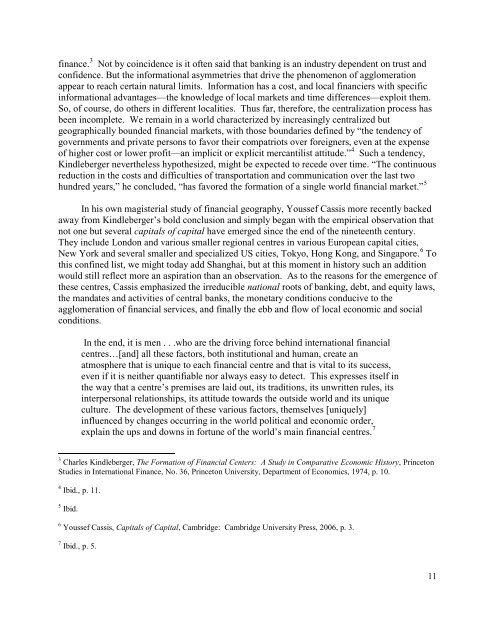Hong Kong's International Financial Centre: Retrospect and Prospect
Hong Kong's International Financial Centre: Retrospect and Prospect
Hong Kong's International Financial Centre: Retrospect and Prospect
Create successful ePaper yourself
Turn your PDF publications into a flip-book with our unique Google optimized e-Paper software.
finance. 3 Not by coincidence is it often said that banking is an industry dependent on trust <strong>and</strong><br />
confidence. But the informational asymmetries that drive the phenomenon of agglomeration<br />
appear to reach certain natural limits. Information has a cost, <strong>and</strong> local financiers with specific<br />
informational advantages—the knowledge of local markets <strong>and</strong> time differences—exploit them.<br />
So, of course, do others in different localities. Thus far, therefore, the centralization process has<br />
been incomplete. We remain in a world characterized by increasingly centralized but<br />
geographically bounded financial markets, with those boundaries defined by “the tendency of<br />
governments <strong>and</strong> private persons to favor their compatriots over foreigners, even at the expense<br />
of higher cost or lower profit—an implicit or explicit mercantilist attitude.” 4 Such a tendency,<br />
Kindleberger nevertheless hypothesized, might be expected to recede over time. “The continuous<br />
reduction in the costs <strong>and</strong> difficulties of transportation <strong>and</strong> communication over the last two<br />
hundred years,” he concluded, “has favored the formation of a single world financial market.” 5<br />
In his own magisterial study of financial geography, Youssef Cassis more recently backed<br />
away from Kindleberger’s bold conclusion <strong>and</strong> simply began with the empirical observation that<br />
not one but several capitals of capital have emerged since the end of the nineteenth century.<br />
They include London <strong>and</strong> various smaller regional centres in various European capital cities,<br />
New York <strong>and</strong> several smaller <strong>and</strong> specialized US cities, Tokyo, <strong>Hong</strong> Kong, <strong>and</strong> Singapore. 6<br />
To<br />
this confined list, we might today add Shanghai, but at this moment in history such an addition<br />
would still reflect more an aspiration than an observation. As to the reasons for the emergence of<br />
these centres, Cassis emphasized the irreducible national roots of banking, debt, <strong>and</strong> equity laws,<br />
the m<strong>and</strong>ates <strong>and</strong> activities of central banks, the monetary conditions conducive to the<br />
agglomeration of financial services, <strong>and</strong> finally the ebb <strong>and</strong> flow of local economic <strong>and</strong> social<br />
conditions.<br />
In the end, it is men . . .who are the driving force behind international financial<br />
centres…[<strong>and</strong>] all these factors, both institutional <strong>and</strong> human, create an<br />
atmosphere that is unique to each financial centre <strong>and</strong> that is vital to its success,<br />
even if it is neither quantifiable nor always easy to detect. This expresses itself in<br />
the way that a centre’s premises are laid out, its traditions, its unwritten rules, its<br />
interpersonal relationships, its attitude towards the outside world <strong>and</strong> its unique<br />
culture. The development of these various factors, themselves [uniquely]<br />
influenced by changes occurring in the world political <strong>and</strong> economic order,<br />
explain the ups <strong>and</strong> downs in fortune of the world’s main financial centres. 7<br />
3 Charles Kindleberger, The Formation of <strong>Financial</strong> Centers: A Study in Comparative Economic History, Princeton<br />
Studies in <strong>International</strong> Finance, No. 36, Princeton University, Department of Economics, 1974, p. 10.<br />
4 Ibid., p. 11.<br />
5 Ibid.<br />
6 Youssef Cassis, Capitals of Capital, Cambridge: Cambridge University Press, 2006, p. 3.<br />
7 Ibid., p. 5.<br />
11


